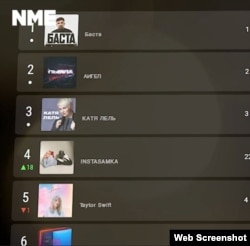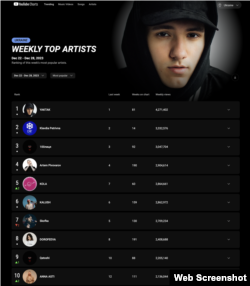On January 3, a popular Russian pro-war Telegram channel “notes_veterans” wrote that according to YouTube, none of the platform’s most watched musicians in Ukraine are singing in Ukrainian:
"It’s just that YouTube Music published the TOP artists … in Ukraine. Not a single performer in Ukrainian."
That is false.
Musicians singing in Ukrainian dominated all of YouTube’s weekly charts of top artists in Ukraine in 2023 as shown in YouTube’s own data.
The “notes_veterans” Telegram channel, which has 305,000 subscribers, features posts that are almost exclusively in support of the Russian war in Ukraine. When writing about Ukrainian people, the channel uses the derogatory slang term khokhly. Its posts mirror and promote the Kremlin’s anti-Ukraine propaganda narratives.
In claiming that Ukrainians are not watching music videos in Ukrainian on YouTube, “notes_veterans” included a screenshot showing a list of the top five performers, four of whom are Russians, along with Taylor Swift, who sings in English. The screenshot has the logo of New Musical Express, or NME, a British musical magazine, but has no reference to the source.
A Google search using the screenshot found the likely source of the “notes_veterans” post — another Russian propaganda Telegram channel, “sheyhtamir1974.” It claimed, also citing NME, that Ukrainians are not listening to performers on YouTube singing in Ukrainian:
“YouTube Music has published viewership statistics for the whole world. The New Musical Express magazine found a very interesting fact. The most popular musicians in Ukraine turned out to be Russian performers. According to the results of this year for YouTube Music in Ukraine, in 2023, Russian music was the most often listened to and the content was created most often for Russian performers.”
In addition to the screenshot later used by the “notes_veterans” channel, “sheyhtamir1974” attached to its post a video featuring the NME logo. Polygraph.info couldn’t locate the video on NME’s website or its social media pages, including Instagram, YouTube, Facebook, X, and TikTok. The New Musical Express magazine had not responded to a Polygraph.info request to verify the screenshot and the video by the time of this writing.
Contrary to the Russian fabrications, YouTube’s own statistics for 2023 showed that Ukrainians preferred watching Ukrainian-language music videos.
Ukrainian-language performers dominated all the weekly YouTube charts in Ukraine in 2023.
Similarly, in Apple Music’s Top 10 Songs of 2023 for Ukraine, eight of the top songs were in Ukrainian, and the other two were in English.
Before Russia annexed Crimea and launched the war in Donbas in 2014, Ukrainians regularly listened to songs in Russian by both Russian performers and Russian-speaking Ukrainian musicians. Ukrainian performers regularly sang in Russian in order to reach millions of Russian speakers in the countries of the former Soviet Union.
After 2014, Russian-language songs gradually began to lose popularity in Ukraine due to their association with the enemy state, while Ukrainian-language music experienced a surge in popularity.
"People listen much less to Russian-language music and prefer to choose a Ukrainian song. That trend has been going on since 2014," music journalist Julian Novak told NOS Nieuws, a Dutch public news website, in July 2022.
The full-scale invasion of Ukraine in 2022 only intensified these trends.
In YouTube’s “Weekly Top Artists” list for Ukraine for February 11-17, 2022, just before Russia launched its full-fledged invasion of Ukraine, eight of the 10 most-popular artists sang in Russian while two sang in Ukrainian.
According to Apple Music, Russian artists have disappeared almost entirely from the top 10 in Ukraine, Kazakhstan, Kyrgyzstan and Lithuania since the beginning of the war, RBC, a Moscow-based news website, reported in December 2022.
RBC found that the most significant changes in preferences among listeners in the countries of the former Soviet Union occurred among those in Ukraine.
“If a year ago almost the entire top 10 for this country was represented by Russian musicians and only ninth place was occupied by the Ukrainian Ivan Dorn, now... [s]ix out of 10 positions are occupied by Ukrainian performers, two more by the Americans Lady Gaga and Eminem.”
RBC attributed those dramatic changes to the Ukrainian law that came into force in October 2022 limiting the public use of music from the aggressor state, which bans the broadcast of “phonograms, videos and music videos of Russian artists in public places.”
However, the shrinking audience for Russian-language songs and the increasing popularity of those sung in Ukrainian may be part of broader trend that analysts point to of Ukrainians embracing the Ukrainian language in an upsurge of patriotism prompted by the war. In a January 2023 analysis of what music Ukrainians listened to in 2022, Molfar, a London-based OSINT website, reported that musicians who sing in Ukrainian prevailed over Russian-speaking performers:
“From 65 to 96% of the top 100 songs are in Ukrainian or English, with the highest percentage on the Deezer platform at 96%. It also has the smallest percentage of songs in Russian — 2%. The largest percentage of songs in Russian is listened to on Apple Music — 23% and Shazam — 20%.”
Last November, Obozrevatel, a Kyiv-based news website, reported that Russian-singing musicians had disappeared from the top 10 of Ukrainian YouTube:
“For the first time in many months, most Ukrainians watching music on YouTube have abandoned Russian content. The Top 10 in the popular selection as of today, November 7, consists of tracks by Ukrainian singers and foreign hits only.”







